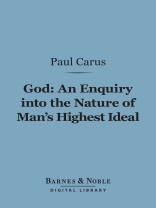In this 1908 work for believers and skeptics alike, the distinguished theologian discusses the human relationship to the concept of God. He invokes the need for traditionalists to make room for interpretation, asserts the selfishness of belief in an eternal soul, and considers whether Christian theists are really pagans.
Despre autor
Paul Carus (1852-1919) was a German-American author, philosopher, theologian, and editor. Brought up in an orthodox Protestant family, Carus developed liberal ideas which prompted him to move away from home to America. He edited several journals promoting free thought, then went on to write books, as well as correspond with figures such as Tolstoy, Edison, and Booker T. Washington. He pioneered interfaith dialogue, as well as created his own concept of religion, called the Religion of Science. He wrote The Soul of Man (1891), The Gospel of Buddha (1894), Nietzsche and Other Exponents of Individualism (1914), among many others.












